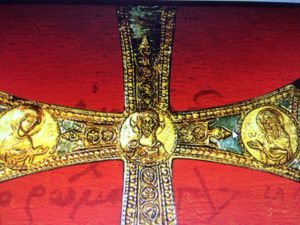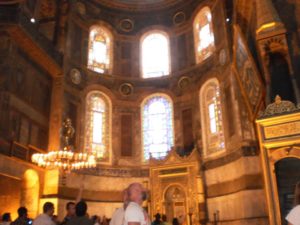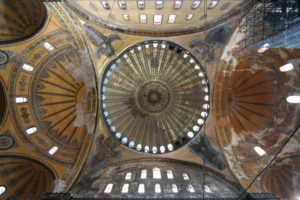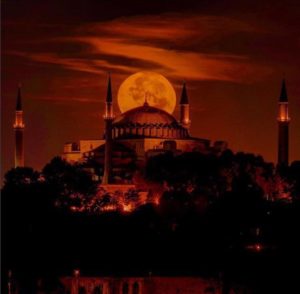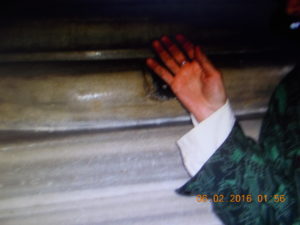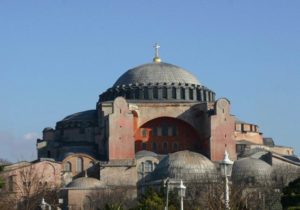Bell of Hagia Sophia
Bit by bit may thou break the silence
And once more may the new ages sound the Resurrection
May an azure glory sprout
Upon the lamentation of the ruins
From this glory of thine that will come
From this flash of the lightning bolt
was I born
That is why my voice, too,
Is a loosened bell
That still weeps.
Μάιος, 1988
“Όσα ούτε είδομεν ούτ’ ελάβομεν,
ταύτα φέρομεν” είπε ο Ηράκλειτος
Η γη της Μικρασίας, δεν είναι μόνον η πατρίδα των προσφύγων, η πατρίδα του από αιώνων Ελληνισμού, αλλά και των μεγάλων οραματιστών της Ιωνίας, Στη γη εκείνη γεννήθηκαν τα μεγάλα υπερβατικά οράματα των Ιώνων φιλοσόφων, που μέχρι σήμερα και για πάντα θα καταυγάζουν την πνευματική μοίρα του κόσμου. Είναι το βάθος του χρόνου, το βάθος και η Αρχή της ελληνικής σκέψης. Και με αυτή την εννοια, δεν είναι μόνον η πηγή και η ρίζα, δεν είναι μόνον ο πόνος και το αίμα του πόνου. Είναι η πιο βαθιά ουσία του πνεύματος που παραμένει στον αιώνα Ελληνικό. Η δουλεία και η άλωση, η συντριβή και ο εκπατρισμός, έχουν συντελεστεί στον εξωτερικό συμβατικό χρόνο. Όμως αυτό δεν αναιρεί ούτε σπιθαμή ελληνικότητας από το πνευματικό και υπαρξιακό της βάθος. Κάποτε έγραφα:
Πατρίδα που χώρεσες σ’ ένα εικόνισμα
Ποτέ χαμένη
Αλύτρωτη μόνο
Σε βρίσκω κάτω από την εφημερότητά μου
Γεμάτη ρωγμές που σκίζουν τον ύπνο μου
Να αναβλύσει το αίμα.
Ανήκω στη δεύτερη γενιά των ξεριζωμένων
Παιδί των προσφύγων, βίωσα τη μνήμη του αίματος. Και όταν έφυγε ο πατέρας, έγραψα ένα μικρό βιβλίο “Σπίτι μου της Μικρασίας”. Είναι μια αναφορά στο Σπίτι-Σύμβολο της Μικρασίας, που αναδύεται φλεγόμενο από τα βάθη του Ιωνικού χρονου, για να με φέρει στην ίδια παράλληλο με τους αιώνες ζωής του. Ένας λόγος πέρα από την εμπειρία. Δεν έχω μνήμες δικές μου εγώ. Είμαι η θέληση μόνο, μια θέληση γεμάτη πείσμα, να κρατηθεί ζωντανή η ρίζα. Εκείνοι που βίωσαν εκεί την εγκοσμιότητά τους, από τον Ηράκλειτο έως τον πρόσφυγα πατέρα μου, αποτελούν σε βάθος μια Ελλάδα αδιαίρετη και απόρθητη στον αιώνα.
Γιατί η ψυχή και το πνεύμα, η βίωση του Λόγου ως κοσμικής έκφρασης, δεν εκπορθούνται, που σημαίνει, δεν εκπατρίζονται.
My Asia Minor home
Δεν έχω από σένα παρά τη Γη, όπου κοιμάται ο πατέρας μου. Η πορεία της ζωής του ολόκληρη δεν ήταν παρά μια επιστροφή του στη γη σου.
Δεν ξέρω από σένα παρά τις μνήμες του, μέσα από έναν ήλιο κάθετο πάνω στην πέτρα σου, Πληγή βαθιά κι αγιάτρευτη, όπου παλιρροεί ο χρόνος στις πηγές σου, Σπίτι της Μικρασίας. Μέσα από τούτη την πληγή της μνήμης, μέσα από τούτη την παλιρροή γεννήθηκα.
“Τρεις ή έξι χιλιάδες χρόνια”
Δεν συναντηθήκαμε παρά μόνο ανάστροφα, μέσα στην παλίνδρομη ροή του χρόνου. Στο τραύμα της αλλοτρίωσής σου. Και τώρα τουρκοχώρι, τώρα τουρκοσπίτι. Οι πέτρες σου πονούν μέσα μου από τα ξένα δάχτυλα που σ’ αγγίζουν. Κι ο ήλιος σου στεγνώνει τα δακρυα των ξενιτεμένων. Ο πατέρας έφυγε χωρίς να σε ιδεί ποτέ ξανά. Και τώρα εγώ γυρίζω σε εσένα. Επιστρέφω μαζί του. Με θέλγει η δύναμη του θρήνου σου, Έτρεξες πίσω τους, μα δεν σε είδαν. Τους φώναξες φλεγόμενο από τον πόνο και τον πόθο να τους φτάσεις, μα δεν σε άκουσαν. Και ήρθες σε εμένα. Κύλησες μέσα στις μέρες μου. Χρόνια τυραννάς τη σκέψη μου. Ζητάς να υπάρξεις από τον λόγο μου. Ακούω τη φωνή σου μέσα στον ύπνο μου, φωνή της πέτρας. Απάνω της εγχαράχτηκαν αιώνες Ελλάδα. Είσαι από το υλικό εσυ που “διεκόσμησε το χαος”* Είσαι “ ο νους που κινεί”* εσύ. Είσαι η ύλη που “γίνεται” με τον λόγο μου. Έτσι μπορώ και σε συναντώ. “Γιατί γνωρίσαμε τη μοίρα μας / στριφογυρίζοντας μέσα σε σπασμένες πέτρες / τρεις ή / έξι χιλιάδες χρόνια…”* είπε ο ποιητής. ‘Ομως εγώ σε βρίσκω στα όνειρά μου που το υλικό τους χρονολογείται από τρεις ή έξι χιλιάδες χρόνια. Σε βρίσκω στα βαθη της μνήμης τής πριν από εμένα, όπου εισχωρώ μαγνητικά και αναπόδεικτα. Εσύ ιστορείς και εγώ γράφω.
Όσο σκοτεινός και αν ειναι ο κόσμος…” είπε ο Νίτσε
“…αρκεί ένα κομμάτι ελληνικής σκέψης για να φωτιστεί!”. Και σίγουρα εννοούσε τη σκέψη που γεννήθηκε εκεί, στα χώματά σου, γιατί είπε ακόμα: “Όσο ο κόσμος θα έχει ανάγκη από την αλήθεια, θα έχει ανάγκη από τον Ηρακλειτο”
Και τώρα οι δυο μας, Σπίτι της Μικρασίας
Εγώ από σάρκα κι εσύ από πέτρα. Γη που μιλα. Και γη που σωπαίνει. Κοσμικές ύλες και οι δυο. Κοσμικά μόρια ανεξερεύνητης Αρχης. Μαγνητικές ουσίες από την ίδια νύχτα του πόνου. Η δική μου φθαρτή εγκοσμιότητα. Η δική σου αΐδια. Είσαι η αϊδιότητα του κόσμου εσύ. Η πρώτη μου αρχετυπική κατοικία. Δεν σε είδα ποτέ. Δεν θέλω. Για να μη σε χάσω. Σε προτιμώ έξω από την διαίρεση. Έξω από το αίμα. Κάποτε γίνεσαι μικρή λευκή εκκλησιά που σε κρεμώ στη σκέψη μου και ο κόσμος ευωδιάζει θυμίαμα αγρυπνίας. Είσαι η ιστορία μου εσύ, γραμμένη από τους κόμβους του αίματος που στάλαξαν απάνω σου οι αιώνες μου.
Σμύρνη, Πέργαμος, Μαρμαρονήσι, Πραστειό, Τένεδος
Το καράβι με τους πρόσφυγες χάθηκε μέσα στη νύχτα του πόνου. Και ο χρόνος δεν ξαναγεννήθηκε ποτέ από την τέφρα του. Σε κρεμώ στη σκέψη μου, μικρή λευκή εκκλησιά, κι ανεβαίνω ένα ένα τα σκαλοπάτια σου. Κύλησα τόσο βαθιά μέσα σου, εκεί όπου ο χρόνος αναιρεί την διάρκειά του. Και βαδίζω στις ασημένιες αμμουδιές σου περιπλανώμενη, μεταμορφωτική, να βρώ το νόημα των λόγων σου: “Ο θεός ημέρη ευφρόνη!”*
Πατρίδα ανεξερεύνητης αρχής
Σε κουβαλώ αναδυόμενη στα εφήμερα τοπία μου
Να απομαγνητίζεις την κραυγή
Να ορθρίζεις αίμα
Κύλησες στον δικό μου καιρό
Εκεί όπου παλιρροεί καθημαγμένη η μνήμη
Και ρόδο η άβυσσος βλάστησε εντός μου
Αναδυόμενη η ζωή μου
Από τα χώματα που κοιμούνται
Στη ρίζα μου
Το βιβλιο “Σπίτι μου της Μικρασίας” επανεκδίδεται
από τις Εκδόσεις Πατάκη.
*Και νους επελθών διεκόσμησε χάος”, Εμπεδοκλής
*“τον μεν νουν κινούντα την δε ύλην γενομένην” Αναξαγόρας
*Σεφέρης
*Ηράκλειτος
Το κείμενο δημοσιεύτηκε στην εφημεριδα ΤΟ ΒΗΜΑ ΤΗΣ ΚΥΡΙΑΚΗΣ, στις 15 Μαΐου 2022

